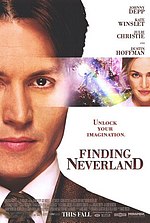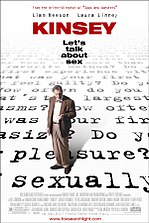

Knight at the Movies ARCHIVES
Fairies Real and Imagined:
Kinsey, Finding Neverland
11-17-04 Knight at the Movies column
By Richard Knight, Jr.
Liam Neeson, who played Oskar Schindler, the man who saved thousands of Jews from certain death, now plays
Alfred Kinsey, the sex researcher who, in his own way, saved millions of gays and lesbians, too. Neeson, again
playing an unlikely hero, is in top form in Kinsey, the oh so gay biopic from the out director/screenwriter of Gods
& Monsters, Bill Condon.
“Let’s talk about sex” is the tagline for the movie and it jumps right in with an early warning against it from
Kinsey's father Alfred, a devout, strict minister (played by a really nasty John Lithgow). “Lust has a thousand
avenues. It grows new heads everywhere,” he says, warning his young, impressible son. Alfred Jr. must have
subconsciously misheard the warning as a challenge to explore each and every one of those avenues for as the
movie tells us, he and his “inner circle” did just that.
Before that, Kinsey spent many years as an etymologist foraging in the woods for his precious rare bugs, as a
college professor, husband (to the steely Clara McMillen, played with authority by Laura Linney) and father. After
being approached by several of his married students for information on sex, he began teaching health classes that
included large doses of sex education (classes that were protested by a conservative, fellow professor, ironically
played by Tim “Sweet Transvestite” Curry). Realizing the paucity of available sex data, Kinsey and his sex
research groupies (led by Clara and handsome assistant Clyde, the knowing Peter Sarsgaard) determined to pull
back the repressive dark curtain drawn over American sex lives which existed before his groundbreaking studies
were first published in the late 1940s.
From the first Kinsey was determined to document the entire sex spectrum and the movie shows us Neeson and
Sarsgaard anxiously prowling a gay bar in Chicago trying to get someone to sit for one of Kinsey’s famous in-depth
interviews (John Epperson, better known as the drag illusionist Lypsinka, plays one of the queers who turns them
down.) Harley Cross plays the unnamed gay man who finally agrees to talk to them. “It’s not that I mind being
queer. I just wish other people weren’t so put out by it,” he quietly says (perfectly mouthing my thoughts about
the Christian Far Right). Kinsey, curious and titillated after glimpsing a full frontal nude Clyde, is soon getting it on
with his assistant. Later, in a hilarious scene that subverts the audience’s expectations, director Condon shows us
Clyde and Clara also happily sharing a bed and the movie hints at a lot of other bed hopping in the Kinsey group.
But an encounter with one subject, an admitted (and very frank) sex addict (played with unnerving authority by
William Sadler) sickens assistant Wardell Pomeroy (Chris O’Donnell – where has he been?) and even momentarily
unnerves Kinsey.
Gays and lesbians, however, the movie makes clear, owe Kinsey a huge debt of gratitude. We were the real
beneficiaries of his then daring revelation that gay and lesbian sex (not to mention masturbation), though
underground, was rampant and that much of the straight “curious” population had given it a twirl. Director Condon
(who also wrote the screenplay) honors this at the film’s highpoint near its end with a scene in which Lynn
Redgrave as an unnamed lesbian thanks Kinsey for literally saving her life with the publication of his findings.
By that time, Kinsey and company were mired in controversy extending from the public outcry over his findings and
his refusal to help self-loathing closet homo J. Edgar Hoover root his lavender brethren out of the State
Department. Kinsey had lost his major funding, been turned on by many in his running scared inner circle and was
vilified throughout the nation. The hullabaloo had taken a huge toll on his health and he was encouraged by many
to give up his sex studies. Yet in the scene with Redgrave, Condon imagines a blessing for Kinsey that hopefully he
got in real life. Certainly, the timing of this sexy picture’s opening, at the dawning of four years with a newly
empowered conservative ruling class, is a bit of a blessing itself.
+++++++++++++++++++++++++++++++++++++++++++++++++++++++++++++++
If you believe in fairies clap your hands for the magical, wondrous Finding Neverland. This is the story,
“inspired” by true events, of how English writer James M. Barrie created his classic Peter Pan. Johnny Depp, in
another of his remarkable transformation/performances plays Barrie with his usual assortment of acting tics
(listen to his pronunciation of “tse-tse” fly). At the outset of the movie, set in London in 1903, Barrie has had
another play flop and his producer (Dustin Hoffman) is urging him to do something more commercial, his wife is
concerned with social climbing and all he wants to do is sit in the park and play with his new friends: the sons of a
young, beautiful widow he meets there (Kate Winslet). All become instrumental in his creation of the story of the
boy who refuses to grow up.
Sadly, we are vividly shown that, though it is perhaps more satisfying than anything in real life, there is a price to
be paid for “all that pretending,” that deep play. This amazing film is director Marc Foster’s follow-up to his
equally celebrated, though very gritty and intense melodrama, Monster’s Ball, and is its polar opposite. Foster’s
ability to handle two such diverse subjects is a testament to a great talent and I eagerly await his next movie.
“Unlock your imagination” is the film’s tagline and we can be astonished and grateful that the film does just that –
in many creative, charming ways.
Kinsey, Finding Neverland
11-17-04 Knight at the Movies column
By Richard Knight, Jr.
Liam Neeson, who played Oskar Schindler, the man who saved thousands of Jews from certain death, now plays
Alfred Kinsey, the sex researcher who, in his own way, saved millions of gays and lesbians, too. Neeson, again
playing an unlikely hero, is in top form in Kinsey, the oh so gay biopic from the out director/screenwriter of Gods
& Monsters, Bill Condon.
“Let’s talk about sex” is the tagline for the movie and it jumps right in with an early warning against it from
Kinsey's father Alfred, a devout, strict minister (played by a really nasty John Lithgow). “Lust has a thousand
avenues. It grows new heads everywhere,” he says, warning his young, impressible son. Alfred Jr. must have
subconsciously misheard the warning as a challenge to explore each and every one of those avenues for as the
movie tells us, he and his “inner circle” did just that.
Before that, Kinsey spent many years as an etymologist foraging in the woods for his precious rare bugs, as a
college professor, husband (to the steely Clara McMillen, played with authority by Laura Linney) and father. After
being approached by several of his married students for information on sex, he began teaching health classes that
included large doses of sex education (classes that were protested by a conservative, fellow professor, ironically
played by Tim “Sweet Transvestite” Curry). Realizing the paucity of available sex data, Kinsey and his sex
research groupies (led by Clara and handsome assistant Clyde, the knowing Peter Sarsgaard) determined to pull
back the repressive dark curtain drawn over American sex lives which existed before his groundbreaking studies
were first published in the late 1940s.
From the first Kinsey was determined to document the entire sex spectrum and the movie shows us Neeson and
Sarsgaard anxiously prowling a gay bar in Chicago trying to get someone to sit for one of Kinsey’s famous in-depth
interviews (John Epperson, better known as the drag illusionist Lypsinka, plays one of the queers who turns them
down.) Harley Cross plays the unnamed gay man who finally agrees to talk to them. “It’s not that I mind being
queer. I just wish other people weren’t so put out by it,” he quietly says (perfectly mouthing my thoughts about
the Christian Far Right). Kinsey, curious and titillated after glimpsing a full frontal nude Clyde, is soon getting it on
with his assistant. Later, in a hilarious scene that subverts the audience’s expectations, director Condon shows us
Clyde and Clara also happily sharing a bed and the movie hints at a lot of other bed hopping in the Kinsey group.
But an encounter with one subject, an admitted (and very frank) sex addict (played with unnerving authority by
William Sadler) sickens assistant Wardell Pomeroy (Chris O’Donnell – where has he been?) and even momentarily
unnerves Kinsey.
Gays and lesbians, however, the movie makes clear, owe Kinsey a huge debt of gratitude. We were the real
beneficiaries of his then daring revelation that gay and lesbian sex (not to mention masturbation), though
underground, was rampant and that much of the straight “curious” population had given it a twirl. Director Condon
(who also wrote the screenplay) honors this at the film’s highpoint near its end with a scene in which Lynn
Redgrave as an unnamed lesbian thanks Kinsey for literally saving her life with the publication of his findings.
By that time, Kinsey and company were mired in controversy extending from the public outcry over his findings and
his refusal to help self-loathing closet homo J. Edgar Hoover root his lavender brethren out of the State
Department. Kinsey had lost his major funding, been turned on by many in his running scared inner circle and was
vilified throughout the nation. The hullabaloo had taken a huge toll on his health and he was encouraged by many
to give up his sex studies. Yet in the scene with Redgrave, Condon imagines a blessing for Kinsey that hopefully he
got in real life. Certainly, the timing of this sexy picture’s opening, at the dawning of four years with a newly
empowered conservative ruling class, is a bit of a blessing itself.
+++++++++++++++++++++++++++++++++++++++++++++++++++++++++++++++
If you believe in fairies clap your hands for the magical, wondrous Finding Neverland. This is the story,
“inspired” by true events, of how English writer James M. Barrie created his classic Peter Pan. Johnny Depp, in
another of his remarkable transformation/performances plays Barrie with his usual assortment of acting tics
(listen to his pronunciation of “tse-tse” fly). At the outset of the movie, set in London in 1903, Barrie has had
another play flop and his producer (Dustin Hoffman) is urging him to do something more commercial, his wife is
concerned with social climbing and all he wants to do is sit in the park and play with his new friends: the sons of a
young, beautiful widow he meets there (Kate Winslet). All become instrumental in his creation of the story of the
boy who refuses to grow up.
Sadly, we are vividly shown that, though it is perhaps more satisfying than anything in real life, there is a price to
be paid for “all that pretending,” that deep play. This amazing film is director Marc Foster’s follow-up to his
equally celebrated, though very gritty and intense melodrama, Monster’s Ball, and is its polar opposite. Foster’s
ability to handle two such diverse subjects is a testament to a great talent and I eagerly await his next movie.
“Unlock your imagination” is the film’s tagline and we can be astonished and grateful that the film does just that –
in many creative, charming ways.
Two great biopics: we must be getting close to award time


